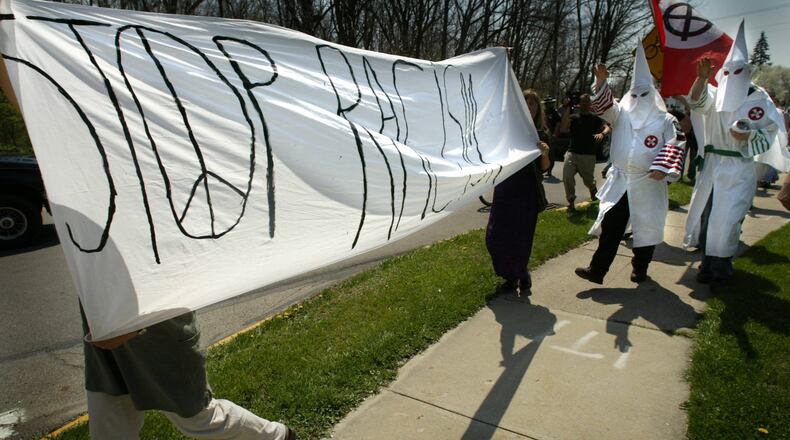Dayton filed a lawsuit March 13 in Montgomery County Common Pleas Court citing a danger to the community if Klan members and their supporters were allowed to rally in a paramilitary fashion, something the agreement prevents, said Barbara Dosek, Dayton’s city attorney.
“The city’s primary goal is keeping our residents safe while this rally occurs,” Dosek said during a Monday news conference. “This agreement does not mean we accept their hateful views or their presence is supported by our leadership, our community or our residents.”
RELATED: Klan group won’t agree to all of Dayton’s terms for rally
Dayton got most, but not all, of the items it asked for in the consent decree, having first presented the Klan group with at least 14 specific stipulations for the rally.
During three or four multiple negotiating sessions via conference call, the Indiana-based Klan group didn’t budge on two of the terms the city originally proposed: that the Honorable Sacred Knights not carry any firearms and keep their faces uncovered.
“Most will have their faces covered by facemask/bandana,” Robert Morgan with the Honorable Sacred Knights wrote back to city attorneys.
The group told the city it was willing to comply with a majority of the provisions, including not carrying long guns or assault rifles, but would be legally carrying side arms to the 1-3 p.m. rally.
MORE: Coming KKK rally in Dayton prompts flurry of protest training
The Klan group said it could have rallied without any consent decree in place.
“We did not have to agree with any of the terms, but we felt as long as our rights are being honored, then there’s no reason to disagree,” the group wrote Monday. “We never planned to carry assault rifles or incite violence.”
The Honorable Sacred Knights said it was ready to file suit against the city — and remains prepared to do so — if members’ Second Amendment rights are yet violated.
Despite the city’s two concessions, the consent decree provides the community more guarantees for a safer event, Dosek said. Agreement or not, the rally would still take place, she said.
But the group will not wear tactical gear nor “incite any violence against our residents or solicit violence during this rally,” she said.
Only those associated with the Klan group holding the rally permit will be allowed on Courthouse Square and Dayton police will control when and how the KKK group enters and exits the venue and must “immediately leave the Dayton downtown area after the rally is concluded,” according to the consent decree.
“If they fail to comply with the terms of the consent decree, then the Dayton Police Department may immediately shut down the rally and remove the hate group from Courthouse Square,” Dosek said.
Dosek said negotiations with the Klan group led the city’s law department to believe about six to 10 members will attend the rally. The KKK group estimated Monday that 20 or more will attend.
Montgomery County, which owns Courthouse Square, approved the permit in February for 10 to 20-plus individuals, according to the group’s application signed by Morgan, who gave a Madison, Ind., post office box address.
Other communities’ experience legally challenging groups like the KKK helped inform Dayton’s response, Dosek said.
MORE: Communication key to Klan group rally in Dayton, Charlottesville survivor says
Multiple groups that participated in the “Unite the Right” rally in Charlottesville, Va., in 2017 were sued and entered consent degrees agreeing not to return to the city and to “engage in coordinated armed activity” during rallies and protests, according to Georgetown Law.
The consent decrees settled the claims against them made by the city of Charlottesville, local businesses and neighborhood groups following violence that erupted between alt-right protesters and counter protesters. White nationalist groups came in helmets, matching uniforms and used shields, batons, clubs.
An Ohio man used his car as a weapon, ramming a crowd and killing 32-year-old anti-racist protester Heather Heyer. More than 70 people were injured.
About the Author

